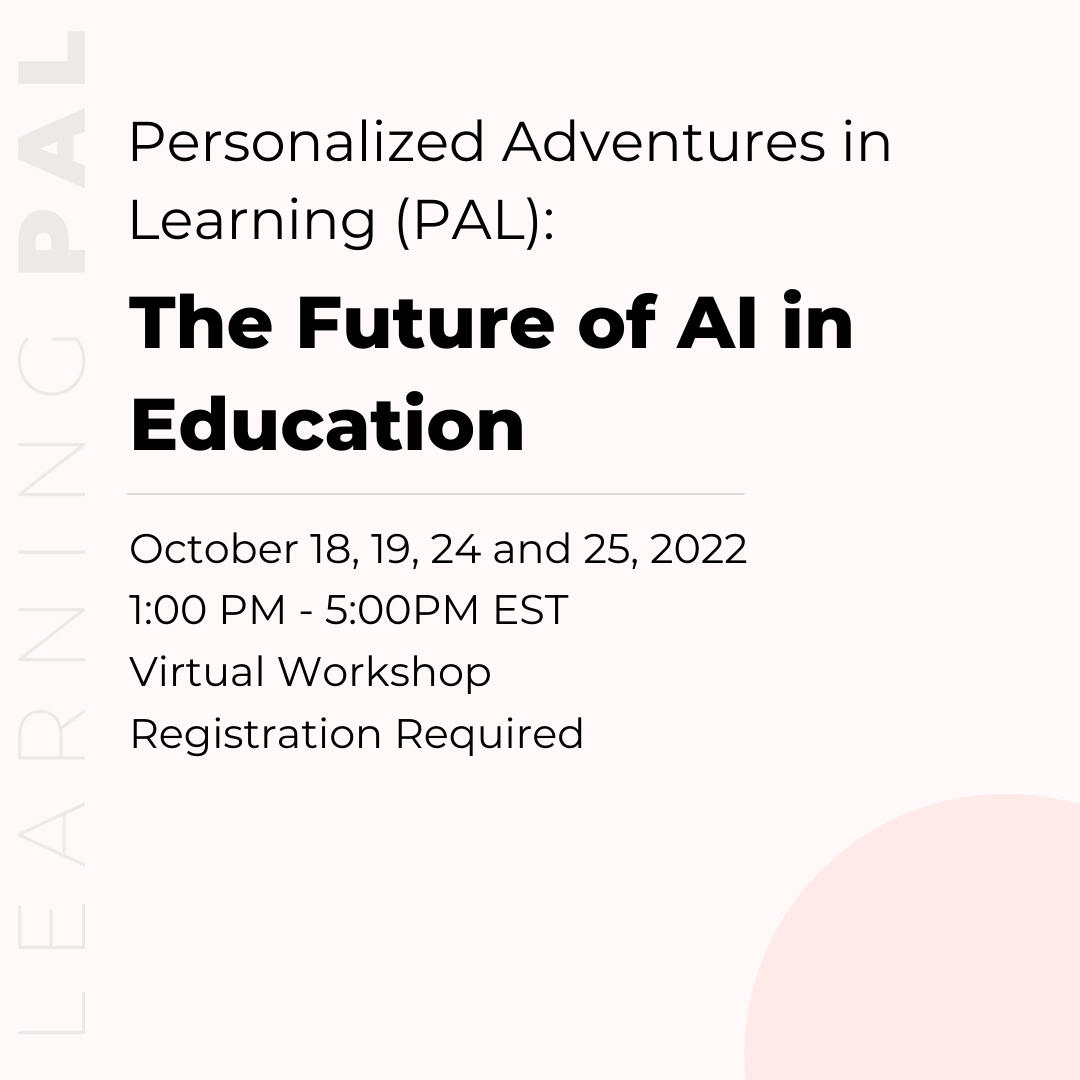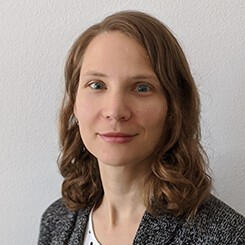The NSF PAL Ideation Workshop has ended. The final report is available here, and the workshop recordings and slideshow PDFs are available here.
Personalized Adventures in Learning (PAL):
The Future of AI in Education
Convergence Accelerator Ideation Workshop
Free to attend
Virtual Workshop
October 18, 19, 24 and 25, 2022
1:00PM - 5:00PM EST
An ideation workshop conducted by the University of Massachusetts Amherst, October 18-19, 2022 and October 24-25, 2022.
Supported by the National Science Foundation’s (NSF) Convergence Accelerator Program (Con-Accel), the primary objective is to develop a convincing and compelling rationale for NSF to establish a Con-Accel funding track in 2023 to support creation of smart and integrated platforms, devices and processes for education technology.
We seek projects that address the future potential of AI and Data Science in education through the listed outcomes:
A list of projects ideas currently underway that indicate the value and impact to society if a funding track were established and funded by NSF;
Engagement of stakeholders from the various PAL-related fields in which participants review and consider identified projects within a potential funding track and the impacts to society
A compelling case statement as to why the NSF should establish a funding track to support PAL projects under Con-Accel.

Those who participate in the ideation process, or whose projects are identified as potential exemplars of the PAL theme, may gain special knowledge and insight into future PAL-related projects and will be well-positioned to respond to proposed NSF solicitations.
BENEFITS FOR SOCIETY
U.S. education has a pressing need for improved online education.
Low reading and mathematics scores
Problems of racism and inequity
Student failure in online learning
Gaps resulting from Covid
Mental health issues
U.S. students failing to achieve international standards

Project Rationale
Current educational technologies have many liabilities. They do not leverage basic research on learning, nor have a culture of continuous improvement, nor meet the needs of diverse learners, nor leverage the growing power of computers. Significant technology exists, as does knowledge of what needs to be done. What is needed now is a concerted effort among different sectors to create an agenda that leads to real solutions for immediate use. One issue is the disconnected, fragmented, and often closed nature of different communities: educators, administrators, parents, commercial ventures, not-for-profit organizations, stakeholders, researchers, and government organizations.This workshop will support communities to reason about fruitful near-term (three year) approaches for scaling up innovative pedagogies. Experts in academia (learning science, AI, human-computer interaction, education, psychology), industry and government will identify barriers and solutions to the delivery of high-quality online education; they will use best practices in design, generate plans for future development and testing, and leverage technology and new modes of platform design.They will plan how to increase the number of trials of new products; identify promising interventions; test more often and fail faster; and evaluate conditions and circumstances that increase the probability of successful products.
Scientific Agenda
The scientific agenda is to investigate and augment human learning at large scale in authentic education settings (online, hybrid, and on-the-job). The workshop will establish a framework for new AI, learning science, and education theory and technologies to understand, model, infer, and respond to learning.
It will optimize every point in the education process to understand students, organize what they can learn, and optimize how they learn. It will explore new theory, algorithms, big data, and systems.
The workshop will couple use-inspired AI research with foundational AI and learning science research in a virtuous cycle and forge new partnerships among diverse stakeholders as they bridge the divide with novel tools from engineers, makers, technologists, and designers. It will make a laser focus on projects that present well-defined deliverables within three years.

Broader Impacts
The workshop will have broader impacts where it matters most – with students, adults, informal learners, and workers (many from underrepresented backgrounds) enabling them to more successfully learn, upskill and reskill.
Thousands of instructors will benefit from open-access to AI-driven power tools for differentiated digital instruction and timely professional development. Educational institutions will benefit from the collective use of these tools, ensuring greater continuity in teaching, and thus greater likelihood of student success.
Communities and industry partners will benefit from a significant increase in the number of skilled workers, convenient, timely, low-cost teaching and training, and new tools to identify and remedy skills-based workforce inequities.
PRINCIPAL INVESTIGATORS
Harvard Graduate School of Education
University System of Georgia
PRODUCTION AND TECHNICAL SUPPORT

Alex Taubman
Zoom Technical Assistant
University of Massachusetts Amherst
THE NSF CONVERGENT ACCELERATOR (C-ACCEL)
Launched in 2019, the National Science Foundation (NSF) Convergence Accelerator program (Con-Accel) addresses national-scale societal challenges through a convergence approach and innovation processes that are use-inspired.
Con-Accel seeks to transition basic research and discovery into practice in order to solve high-impact national societal challenges aligned with specific research themes (tracks). NSF awards ideation grants for the purpose of identifying topical areas to be considered for funding under Con-Accel.
These ideation processes bring together the full range of stakeholders for a given topical research theme in order to provide the NSF with information, project ideas, and an assessment of impact potential for the given theme being considered. The NSF reviews the output of the ideation processes and selects the two or three topics that it feels should have highest funding priority for funding through the Convergence Accelerator program.
To date, the following research tracks have been selected and funded by Con-Accel:
Open Knowledge Networks (2019)
The Future of Work at the Human-Technology Frontier (2019)
Quantum Technology (2020)
AI-Driven Innovation via Data Sharing and Model Sharing (2020)
Networked Blue Economy (2021)
Trust & Authenticity in Communications Systems (2021)
Securely Operating Through 5G Infrastructure (2021)
Enhancing Opportunities for Persons with Disabilities (2022)
Sustainable Materials for Global Challenges (2022)
Food & Nutrition Security (2022)

CALL FOR PROJECT IDEAS
As part of the deliverables, the PAL ideation process seeks to identify research projects that address the future of AI and Data Science in education and that meet certain broad criteria.
SUBMIT YOUR PROJECT IDEAS
If you or someone you know has project ideas that you would like to consider for our final report to NSF, please click on the link below and complete the form to submit the project title, a brief abstract, and contact information.
Projects need to deliver tangible products, resources, or processes that empower students, teachers, parents and stakeholders within a three-year time-frame following funding.

CRITERIA
The following overarching priorities will guide appropriate projects:
Use-inspired AI Research
Projects will entail need-based research that focuses on the practical application of AI/Data Science research to optimize one or more of the many points in the education process, from understanding student needs, to organizing what and how they learn, and how to better impart and integrate knowledge into the student’s consciousness.
Projects will investigate and augment human learning in the full array of authentic education settings (e.g., classroom, remote virtual, hybrid, and on-the-job) and will study and leverage data to establish a framework for new AI theory and methods, learning science and real-world education practices (pedagogies).

Projects will impact a broad range of knowledge systems, including traditional core fields of study, work-related training, applied life skills training, and contextual competencies that can be deployed life-long and life-wide.
Customized Education Systems to Provide Personalized Learning
Projects will develop rich new AI models and inference methods to gain a deeper understanding of students and corresponding analytical methods to infer key student factors from data sets. New models are important for all learners, especially adult learners, who tend to have idiosyncratic attributes and can benefit significantly from personalized learning strategies catered to their individual needs.
AI research issues here include technologies that understand, model, infer, and respond to real human learning through multimodal data integration, generalization of learned models to new tasks, interpretable machine learning, FEATful (fairness, ethics, accountability and transparency) data-driven models, and data-augmented learning science as well as neuro-symbolic modeling, large-scale ML, and natural language processing (NLP).
Strong Multi-Organizational Partnerships
Projects must demonstrate collaboration, engagement and partnership between and among stakeholders and/or by the outcome(s) intended for the project. It will not be sufficient to simply assert that the research will support certain population segments; representatives of the population segments must be genuinely engaged in the development and implementation of project research, testing and findings.
The ideal project will attract and enliven new communities of AI researchers, learning scientists, and instructors who will engage in rapid learning experiments with diverse student populations. Teams are expected to forge partnerships among stakeholders from several disciplines.
High Probability of Deliverables
The workshop has a laser focus on well-defined practical deliverables that will translate research into practice with measurable outcomes and impacts within three years.

WORKSHOP
Personalized Adventures in Learning (PAL): The Future of AI in Education
Convergence Accelerator Ideation Workshop
October 18, 19, 24 and 25, 2022
1:00PM - 5:00PM EST
Free to attend
For more information, contact Burt Woolf at bwoolf at umass dot edu.
This workshop is sponsored by the National Science Foundation.
For each theme, keynote experts will present lightning presentations followed by breakouts for participant input.
Tentative session schedules listed below.
Workshop Schedule:
ENDED: SESSION 1
Tuesday, October 18, 2022
1:00 PM - 5:00 PM EST (See in your local time)
Theme A: Design, Development, and Testing
1:00 - 3:00 PM
Welcome to the NSF Convergence Accelerator Ideation Workshop
Robots as Social Learning Companions
By Erin Walker
Online Adult Learning: AI Institute
By Myk Garn
AI for Orchestration in the Classroom
Q&A
By Myk Garn
Breakouts
Moderators: Keynote Speakers and Chad Lane
Theme Re-Cap
Moderator: Beverly Woolf, PI
Theme B: Assessment of Educational Research
3:05 - 5:00 PM
Social Analytics
By Carolyn Rosé
How AI Can Empower Component-Based Educational Research
By Chris Dede
Opportunities Matter: Hybrid Human-Computer Tutoring Toward Educational Equity
Q&A
By Chris Dede
Breakouts
Theme Re-Cap
Moderator: Beverly Woolf, PI
ENDED: SESSION 2
Wednesday, October 19, 2022
1:00PM - 5:00 PM EST (See in your local time)
Theme C: Learning at Scale
1:00 - 3:00 PM
Welcome
Future of Stealth Assessment
By Val Shute
Data-driven Item Selection and Generation in Assessments and Learning
By Andrew Lan
Crowdsourcing Paves the way for Personalized Learning
Q&A
Moderator: Andrew Lan
Breakouts
Theme Re-Cap
Moderator: Beverly Woolf, PI
Theme D: Ethical and Equitable
3:05 - 5:00 PM
Rapid Workforce Development
Bilingual Tutor
By Ivon Arroyo
Q&A
Moderator: Andrew Lan
Breakouts
Theme Re-Cap
Moderator: Beverly Woolf, PI
ENDED: SESSION 3
Monday, October 24, 2022
1:00PM - 5:00 PM EST (See in your local time)
Theme E: Entrepreneurial, Not-for-profit, and Government Digital Learning Systems
1:00 - 4:00 PM
Welcome
Aligning Curricula with Skills and Jobs
By Robby Robson
Foreign Language Learning
Intelligent Game-based Assessment and Tutoring
Q&A
Breakouts
Theme Re-Cap
Moderator: Beverly Woolf, PI
Large Scale Commercialization
By Steve Ritter
The EdTech Investment Climate
By Max Woolf
Recap of Project Ideas (Part 1)
4:00 - 5:00 PM
Brainstorming Session Part 1: Project Possibilities, Collaboration and Synergy, Engaging Users
Panelists: Beverly Woolf and selected Keynote Speakers
Facilitator: Burt Woolf, Ed.D.
In this session, the panelists and participants will explore three questions:
Promising Possibilities: What projects and/or ideas for AI in Education have you heard, are thinking about, or are aware of that would benefit from an NSF Con-Accel Funding Track?
Collaboration and Synergy: Which projects overlap or where are we working toward similar impact? What combinations (integration, blending, piggybacking, dovetailing) of research efforts would amplify the impact of AI in education and learning?
Realizing our Shared Transformative Vision: In what ways might we engage users to help address and overcome inherent limitations, barriers and biases in our research efforts so that we might be more effective in realizing our vision for AI in the world of education and learning?
ENDED: SESSION 4
Tuesday, October 25, 2022
1:00PM - 4:00 PM EST (See in your local time)
Recap of Project Ideas (Part 2)
1:00 - 4:00 PM (or earlier)
Welcome
Innovative Education Technology from the US Department of Education
By Ed Metz
Brainstorming Session Part 2: Project Possibilities, Collaboration and Synergy, Engaging Users
Panelists: Beverly Woolf and selected Keynote Speakers
Facilitator: Burt Woolf, Ed.D.
In this session, the panelists and participants will explore three questions:
Promising Possibilities: What projects and/or ideas for AI in Education have you heard, are thinking about, or are aware of that would benefit from an NSF Con-Accel Funding Track?
Collaboration and Synergy: Which projects overlap or where are we working toward similar impact? What combinations (integration, blending, piggybacking, dovetailing) of research efforts would amplify the impact of AI in education and learning?
Realizing our Shared Transformative Vision: In what ways might we engage users to help address and overcome inherent limitations, barriers and biases in our research efforts so that we might be more effective in realizing our vision for AI in the world of education and learning?
Workshop ends at 4:00 PM
THEMES
The PAL Ideation Workshops will focus on the following five topical themes that will be featured in our workshop sessions, keynote presentations, and project ideas.
THEME A
Design, Develop, and Testing
This theme includes development of educational technologies, intelligent tutors, games, and user interfaces; development of new modules or functionality within existing systems and the design of systems and interfaces currently under development. The skill set includes AI, machine learning, models, UX/UI design including needs analysis, wireframing, prototyping, iterative design research, and human factors.
THEME B
Assessment of Educational Research
This theme includes conducting experimental studies in educational settings. The skill set includes expertise working with teachers and students, analyzing data, and interpreting experimental findings. Research focuses on implementing and testing educational technologies in various educational settings (e.g., classrooms, online).
THEME C
Learning at Scale
This theme includes large scale research, better understanding of learning, predicting learning outcomes, and enhancing learning at scale. The skill set includes expertise in conducting and analyzing experimental studies, A/B/n experimental design, database management, R, Python, advanced statistical methodologies, and learning analytics (e.g., machine learning), use of machine learning to address issues of personalization, equity, cost, customization, usability. How can data be collected, processed, and used responsibly for all communities?
THEME D
Diversity, Equity, and Inclusion
This theme includes development of equitable, supportive, affirming, and beneficial environments for students of all cultures, backgrounds, and identities. We need to directly address pervasive ethnic and racial disparities and examine models and data sets for bias (gender, race, nationality, culture), including advocating for marginalized populations. We focus only on short term pain points, we need to solve for the longer run majority who are facing crucial life conditions that could benefit from better life-long design. This theme will identify benefits that accrue from diversity.
THEME E
Entrepreneurial, Not-for-profit, and Government Digital Learning Systems
This theme will bring AI and the data revolution to businesses, non-profits, and government organizations. For example, organizations will use AI to improve processes that require reading and understanding text; such tools act as performance multipliers that increase speed and accuracy, decrease cost, and enable businesses to make the best use of time/expertise. Supporting such organizations, e.g., through Kickstarter or Venture Capital will put in place mechanisms to translate research and development into products.
RECORDINGS
View recordings for the NSF PAL Ideation Workshop.
DAY 1: OCTOBER 18, 2022
DAY 2: OCTOBER 19, 2022
DAY 3: OCTOBER 24, 2022
DAY 4: OCTOBER 25, 2022
KEYNOTE EXPERTS
The following people will be delivering keynote remarks at the PAL Ideation Workshops.
REGISTRANT ORGANIZATIONS
Individuals from the following organizations and institutions are currently registered for the PAL Ideation Workshops (List as of October 22, 2022).
| Name of the Institution |
|---|
| 1EdTech Consortium |
| 3M Health Information Systems |
| Abilene Christian University |
| AERDF |
| AI2ES |
| Alelo |
| Apple |
| Arizona State University |
| Ateneo de Manila University |
| AYSET |
| Bamboo Learning |
| Barbara Treacy Consulting |
| Berkeley |
| Booz Allen Hamilton |
| Boston College |
| Building State Capability, Harvard Kennedy School |
| Carnegie Learning, Inc. |
| Carnegie Mellon University |
| Central University of Jharkhand |
| Columbia University |
| Cornell University |
| Crystal Clear |
| Digital & Beyond |
| Digital Promise Global |
| District of Columbia Public Schools |
| Dublin City University |
| Educational Testing Service |
| Eduworks Corporation |
| Elsevier |
| ETH Zurich |
| European parliament |
| FFHS |
| Florida State University |
| George Mason University |
| Georgetown University |
| Georgia Institute of Technology |
| Harvard Graduate School of Education |
| Harvard Next Level Lab |
| Harvard University |
| Harvard-Westlake |
| HSD2 |
| IIT Bombay |
| IIT Delhi |
| Indira Gandhi Delhi Technical University for Women, New Delhi, India |
| ITCILO |
| KIPP NYC |
| KLE Technological University |
| Know Center Gmbh |
| Lakehead University |
| MIT |
| Nanyang Technological University, Singapore |
| National Academies of Sciences Engineering and Medicine |
| National Louis University |
| National Science Foundation |
| NCDE |
| North Carolina State University |
| NYU |
| OpenStax, Rice University |
| Quill.org |
| Royal Roads University |
| Saint Louis University |
| Santa Clara county |
| Skillprint |
| SRG Technology LLC |
| SRI IT Consulting Limited |
| St John's University |
| TeachFX |
| Technical College System Of Georgia |
| TERC |
| The Concord Consortium |
| Trinity College Dublin |
| University of Massachusetts Amherst |
| University of Massachusetts - CICS |
| University of Massachusetts - College of Education |
| Universidad Tecnológica de Nogales |
| Universitas Negeri Malang |
| Universitat Politecnica de Valencia |
| University College London |
| University of Alberta |
| University of Arizona |
| University of British Columbia |
| University of Chicago |
| University of Craiova |
| University of Denver |
| University of Florida |
| University of Illinois, Chicago |
| University of Illinois, Urbana-Champaign |
| University of KwaZulu-Natal |
| University of Louvain |
| University of Massachusetts |
| University of North Carolina |
| University of North Carolina at Charlotte |
| University of Pittsburgh |
| University of Pretoria |
| University of San Diego |
| University of Sheffiled |
| University of Southern California |
| University of State Manado |
| University of Sussex, Brighton, UK |
| University of Turku |
| University of West Georgia |
| UPenn |
| Vanderbilt University |
| WestEd |
| WPI |
GET IN TOUCH
If you have any questions or need help, please fill the form. We will do our best to respond within 12 hours.

























